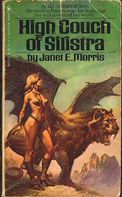
| Series: | Silistra #1 |
| Publisher: | Bantam |
| Copyright: | May 1977 |
| ISBN: | 0-553-10522-1 |
| Format: | Mass market |
| Pages: | 245 |
I'm not sure what possessed me to put this on my want list. It's a pulp-style novel devoted mostly to an elaborate world description, in this case of a planet in the far, far distant future where the technology looks much more like a fantasy novel. It's written in that lavish, overdone style where everything is described in extended and metaphoric detail, and where all units of measurement (hours, miles, month names, etc.) have new, different names. In short, not the sort of book that I generally like.
The hook is that the main character, the first-person narrator, is a prostitute of a sort. The women on her world have a completely unpredictable ovulation cycle and have an extremely difficult time conceiving, which is used as an excuse for making them all elaborate ritual prostitutes of a sort (except for the priests and the disfigured girls who are simple prostitutes). It's an unbelievable background (surely many other solutions should be available) that serves as an excuse to write a submissive main character and allude to a great deal of sex.
That, by itself, is not fatal. Jacqueline Carey used a similar character (without the unbelievable science) as the foundation of her brilliant Kushiel's Legacy fantasy trilogy, and with a female author I was hoping for something less typically sexist and more like that. Alas, while Morris is not John Norman, High Couch of Silistra reads like an early Gor novel with the sexism tuned down. That's not a compliment.
The plot is driven by a quest by the ruler of the most influential center of this odd prostitution (the "high couch" — "couch" is the word used for having sex in Morris's world) to find her mysterious father. Her father is apparently some sort of alien perfection of humanity who bedded her mother, leaving her a child with special abilities and killing her in childbirth. Some sort of complex obligation system symbolized by welded chains around people's waists is used to structure society, and our hero receives such an obligation from her mother to find her father. I was giving the story the benefit of the doubt up to that point, and Estri (now there's a subtle character name) starts out as a confident, promising character. She then proceeds to do basically nothing, wandering about while being dominated by various men, attacked by a strange hooded figure, taken to an advanced race that controls everything, and used as baffling evidence in a political struggle. In the whole story, the number of times she takes any definitive action can be counted on one hand.
In other words, this is basically a waste of an okay idea, hampered by an obviously manipulative plot and a lead character who, despite a somewhat interesting beginning, ends up having no substantive role in the plot other than simply existing. It doesn't even have good sex scenes; the sex all happens tactfully barely off-camera. The Boris Valejo cover, women who run around naked much of the time, and lots of simpering submission and bits of bondage do not erotic fiction make.
Morris describes her world in far more detail than it deserves. There's even a glossary for all the words she makes up, many of which feature all-important apostrophes. (I can't stop thinking of this book as "High Couch of Silly Straw.") The only bits of science fiction serve as thinly veiled excuses to write a sort of sword and sorcery adventure with sorcery replaced by barely-understood advanced technology from other worlds. The ending, when the readers finally meet the beings who are running this strange world (and Estri is led around on a leash like a pet, neatly summarizing what the plot has been doing to her for the entire book), is the most interesting part of the book, but it's not worth the effort of getting there and still suffers from many of the same problems.
In short, unless you really love pulp adventure and fantasy-like "far future," have a very high tolerance for pushover characters, and really want to read a slightly improved Gor novel, avoid.
Followed by The Golden Sword.
Reviewed: 2005-10-25